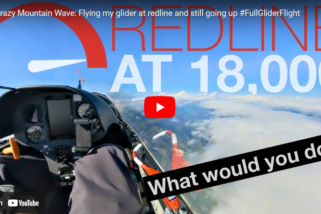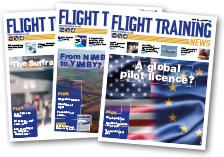Through mid-March, as the number of coronavirus cases in the UK began to rise sharply, many General Aviation businesses began to introduce ‘social distancing’ measures. Some businesses chose to increase their hygiene measures, modify their operations or stop all dual instruction given that in the confines of a GA aircraft, maintaining a six foot separation between instructor and student is not possible. The closure of cafes and restaurants was also having a marked effect on the number of visitors at many GA airfields. By the weekend of the 21st/22nd March, many flying schools and clubs had taken the decision to severely restrict or stop flying altogether.
A typical move was that of Lasham Gliding Club, who on the Saturday informed their members: “All club instruction and mutual flying in club gliders will cease as of today, 21 March, until further notice. This includes all weekday, weekend and evening Groups.
“This move is in order to further decrease the risk of the spread of the virus, and the decision has been informed following a survey of LGS instructors.”
By Monday 23rd, more aviation businesses were following suit and once the Prime Minister made his ‘lock-down’ announcement on Monday evening, it seemed clear that most forms of GA activity was likely to cease. Blackbushe Airport, a busy GA airfield with at least five resident flying schools, was particularly quick off the mark and within 90 minutes of Boris Johnson’s announcement, Blackbushe had e-mailed its residents. In a message headed ‘Airfield Closed’, the e-mail read: in part: “Following the Prime Minister’s public
address this evening, Blackbushe Airport is now closed, effective immediately.
“No flying will be permitted and you will not be able to access the airport site. The Prime Minister’s message was very clear and we must comply with the Government’s measures. “The Airport Team would like to thank you all for your support in this difficult time.
“Stay Safe.”
In the following days, social media noted a very small number of GA flights that were still taking place in the UK, invoking considerable comment. By the 31st March, the Department for Transport issued specific guidance for General Aviation operations. That advice reads:
Recreational flying
“Current government guidance on coronavirus precludes recreational GA flying.
“This is being observed in practice by the vast majority of the GA community, and we are grateful to them for doing so. The message we are receiving from the GA community is that they fully appreciate the need for these restrictions, and observing them is being widely encouraged throughout the community. Again, we are grateful for this.
“Because the directive to stay at home is being well observed, we do not perceive a need to introduce a specific ban on flying by visual flight rules (VFR) as seen in some European countries. This will have the significant benefit of allowing flexibility, and allowing GA flights to resume as overarching restrictions on movement are lifted.
“The above does not apply to search and rescue operations, or where it absolutely necessary to fly to, or for, work. In all of these activities, we expect public organisations and businesses to be socially responsible in the decisions they make, and to apply social distancing guidelines.”
Maintenance workshops
Workshops which carry out essential maintenance are entitled to continue (in line with guidance regarding car workshops) provided PHE guidance is followed:
- follow social distancing advice
- frequently clean and disinfect objects and surfaces that are touched regularly, using your standard cleaning products
Return to business as usual
The general aviation sector is an important contributor to skills, jobs and growth. This government is committed to helping this important STEM sector back on its feet after restrictions are lifted.
The GA team in the Department for Transport is well aware of the structural threat this period of non-activity poses to recreational GA, including with regards to flight training (given that training flights are not currently possible due to directions on social distancing). We are therefore ramping up work to mitigate any long term negative consequences. Similarly, we are taking steps to ensure that when it is safe to do so, we will continue to fully support the GA sector.
As an example of this, we are supporting various GA stakeholders in their dialogue with the Civil Aviation Authority (CAA) regarding extending both pilot medical deadlines, and developing short-term exemptions for those who would have required a flight with an instructor. The CAA’s initial priority has been in developing these for professional pilots. They are now working on similar measures for private licence holders.
Risk of transmission
In some GA flights, the risk of transmission is undeniably negligible, for example where the flight is a solo flight, from a private airstrip, in which no ground travel is required to access the airstrip. Nevertheless, such flights should not take place, in light of the blanket nature of the directive above, and the risk of an accident resulting in the need for social distancing measures to be abandoned.
Air traffic management
Prior to the guidance to stay at home if possible, a large number of GA pilots were active. This placed a strain on NATS, who are trying to limit the non-essential activities performed, including services to GA. This is to ensure the resilience of the critical air traffic management services while complying with current guidance by not having more people on site than necessary.
While most GA activity occurs in uncontrolled airspace, and therefore does not involve NATS, it is important to remember that, when GA activity resumes, it is likely that some restrictions will still be in place, and pilots should therefore be mindful of the strain their activity places on other essential services.
The lower airspace radar services which NATS provide are also offered on a when possible basis, so could be turned off if necessary. Similarly, access to Class D could also be simply refused by the relevant air navigation service provider.







